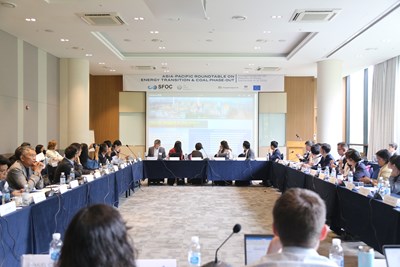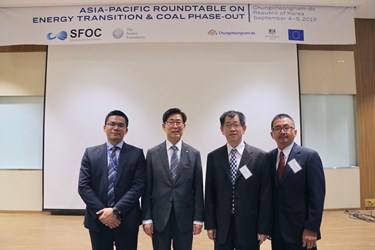
Taichung City Major Shiow-Yen Lu led a delegation to the UK and the Netherlands for a municipal inspection from September 2nd to September 11th for exchanges and cooperation on sustainable cities, clean energy, and circular economy. Meanwhile, the Taichung City Government was also invited to participate in an event co-hosted by non-profit South Korean organization Solutions for Our Climate (SFOC) and the US’ The Stanley Foundation. The “Asia-Pacific Roundtable on Energy Transition and Coal Phase Out” co-hosted by the South Chungcheong Provincial Government and British Embassy was attended by Taichung City Information Bureau Director Wu Huang-sheng, and Section Chief Chen Zhong-yi of the Taichung Environmental Protection Bureau’s Air Quality and Noise Pollution Regulation Section.
The city government expressed a great amount of importance for this Meeting as Director Wu exhibited the City's determination and controls to phase out coal, sharing problems faced by the City Government during the energy transition process. Director Wu also talked about how to regulate the Taichung Power Plant and other power plants that are generating pollution to undergo transitions through coal production statutes and right of issuing permits, ensuring the health of the people and keeping up with worldwide trends.
Director Wu shared this year’s results of the Taichung City Government, which included the implementation of reducing coal usage in the Taichung Power Plant by 40% in 2020 and tightening boiler standards. The new boilers for the power plant will be limited to using gas or recycle energy, and guidance will be provided to modifying existing boilers to using natural gas, adding control facilities, and improving pollution treatment efficiency. In addition, the Taichung City Government also conducted strong pollution inspections this year, and vigorously promoted the replacement of two-stroke and four-stroke motorcycles with subsidies and other compensatory measures. The Taichung City Government proactive improvements to the environment received recognition and support from many other governments in attendance.
The Taichung Environment Protection Bureau explained that the South Chungcheong Province, located on the West coast of South Korea, has established more than 30 power plants such as Baoning and Fuyu Plants in response to national policies and high-power consumption regions around Seoul. With the increase environmental protection awareness and severe smog, local governments and organizations have jointly initiated plans to phase out outdated coal power plants. The Province became the 1st region in Asia to join the Powering Past Coal Alliance (PPCA), which was jointly initiated by the United Kingdom and Canada.
The Taichung Environmental Protection Bureau further explained that the “Asia-Pacific Roundtable on Energy Transition and Coal Phase Out” held by the South Chungcheong Province held a special significance for the coal phase out process of the Asia-Pacific region. The Roundtable not only established communication channels across local governments and non-government organizations in coal-using countries of the Asia-Pacific region, it also allowed participants to share and discuss possible action plans to phase out coal. The Roundtable is expected to establish a multinational and cross-regional cooperation platform to phase out coal; establish controls to reduce carbon emissions, phase out coal, and improve air quality.
To strengthen cooperation among Asian countries, the South Chungcheong Province will hold the “2019 International Conference for Phasing out Coal to Address Climate Change" on October 21st in hopes of forming the "East Asian Local Government Climate Environment Alliance.” The Taichung City Government received a formal invitation letter a few days ago, and is very grateful to the international community for paying attention to Taichung City. The City Government looks forward to having exchanges on responses to combat climate change, and achieving mutual understandings with Eastern Asia.
The Taichung Environmental Protection Bureau pointed out that the citizens of Taichung City have conducted multiple demonstrations to voice strong demands for improving air quality over the past 3 years. The City Government has heard their demands and even though they can’t change the fact that the power plant was set up in Taichung, actions must be taken as the Taichung Power Plant has caused an air pollution crisis. With measures being implemented to reduce coal consumption, the maximum coal consumption amount will be reduced from 18.39 million tons in 2014 to an estimated 11.04 tons in 2020, which marks a reduction of 7.35 million tons. In addition, the Taichung City Government will use the permit extension period to force the Taichung Power Plant to only using 5 plants to generate power using coal during pollution season. This will significantly reduce the pressure of the power plants on Taichung’s air quality.
In response to the improvement of the city's air quality, the Taichung Environmental Protection Bureau pointed out that data from the Executive Yuan Environmental Protection Administration’s Air Quality Monitoring Network indicated that the average value of Particulate Matter 2.5 in Taichung City from January to August 2019 was 17.1 micrograms, which is a 2.1-microgram improvement from 2018. The City only had 25 days of poor air quality this year (AQI average > 100), marking an 18-day improvement from last year’s 43 days. The statistics show that the City’s air quality is steadily improving.
Director Wu emphasized that the City Government firmly believes in promoting coal reduction policies and improving air pollution. Mayor Lu is determined to achieve this goal as it is also the City Government’s only goal, and calls on the public along with public/private venues to make their own contributions to air quality while supporting the City Government’s various regulatory controls.

 Facebook
Facebook
 Twitter
Twitter
 LINE
LINE
